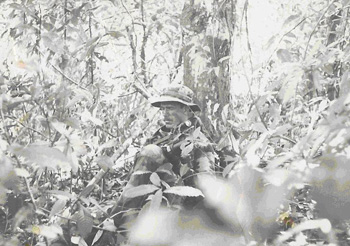

The editors of Air Force Times, Marine Corps Times, Army Times, and Navy Times (publications at Gannett Government Media Corp.) ran an article titled “Transcending Trauma” about the David Lynch Foundation project “Operation Warrior Wellness.”
Although “Transcending Trauma” was a well-written article, there was some incorrect information in these articles. Dr. Matthew Friedman, executive director of the Department of Veterans Affairs National Center for PTSD, was quoted as follows:
“There are no published randomized clinical trials testing transcendental meditation for PTSD.”
CAMS members Col. (Dr.) Brian Rees and Dr. David Leffler coauthored a letter to the editor that was published in the Navy Times and the Marine Corps Times, setting the record straight on this incorrect information. The letter appears in “Opening Shots.” They discussed a random assignment study of Vietnam veterans that was published in the peer-reviewed Journal of Counseling and Development 64: 212-215, 1985. It found that the Transcendental Meditation technique was effective against PTSD.
This is the original 412 word version of the letter by Col. (Dr.) Brian M. Rees and Dr. David R. Leffler that was edited and retitled “Meditation studied in ’85.” It was published online in the 24 Jan 2011 issue of the Navy Times and on page 5 of the 31 January 2011 issue of Marine Corps Times. The Navy Times edited version (222 words) is available online in the middle of their “Letters to the Editor” webpage. [Expired link: https://www.navytimes.com/community/opinion/navy-letters-to-the-editor-012411w/
MEDITATION EFFECTIVE PTSD TREATMENT
In the article “Transcending trauma: Group hopes to teach 10,000 vets to meditate” (Off Duty, 27 December 2010, Original expired URL: http://airforcetimes.va.newsmemory.com/eebrowser/frame/check.8078.translatefix/flash/loadPage.php?token=0L3Xyd3T2c7Vqa%2FG5ZGXnpifhZeVpZCnm5N3ocLb1MTdzdWzlZPNkaacwHBzkKOWkp%2BcnIielZuWqJyQcA%3D%3D), Dr. Matthew Friedman, executive director of the Department of Veterans Affairs National Center for PTSD was quoted as saying: “There are no published randomized clinical trials testing transcendental meditation for PTSD.” However, we are pleased that he remains an open-minded scientist by adding: “Lack of evidence is not the same thing as negative evidence.”
Perhaps Dr. Friedman is unaware of a random assignment study on Vietnam veterans, published in the Journal of Counseling and Development, 1985: (64); 212-215. This peer-reviewed study found the Transcendental Meditation® (TM) technique effective because it directly affects the neurobiological aspects specifically affected by PTSD. University of Colorado School of Medicine researchers demonstrated that TM practice had positive effects on symptoms associated with PTSD. Instruction in the technique, followed by three months of regular TM practice, significantly reduced emotional numbness, anxiety, startle response, depression, alcohol consumption, insomnia, and family problems. The TM group also reported improvements in sleep and obtaining/keeping employment. Seventy percent of the meditators reported that they no longer required the services of the veteran’s center.
In a new pilot study under review, Iraq and Afghanistan veterans experienced a 50% drop in PTSD symptoms by the 4th week, and greater improvements by two months and three months. This study is summarized in the book The Resilient Warrior (2011) by Jerry Yellin and Dr. Sarina Grosswald.
The TM technique involves a simple, non-religious, psychophysiologic practice, demonstrated in over 600 research studies to reduce a wide variety of stress-related problems. Meta-analyses published in peer-reviewed journals provide more evidence for the superior effectiveness of the TM technique over others in the areas of anxiety reduction, lowering blood pressure, self-development, physiological relaxation, improved psychological outcomes, and decreased use of drugs, alcohol, and cigarettes.
In conclusion, research on this program indicates that it produces effects on mind and body opposite to those of chronic stress. The TM technique is a portable strategy. After learning the technique, all one needs is a comfortable place to sit and close the eyes. No additional resources are needed. The self-reliance of this approach appeals to the “warrior mind-set.” To more effectively and efficiently treat the wounded minds of warriors protecting our nation, we need to add innovative approaches into the healing mix of provided services. TM offers a do-less-and-accomplish-more approach that can not only help those precious minds and lives, but also save money in the process.
Col. Brian M. Rees, M.D., M.P.H., US Army Reserve and David R. Leffler, Ph.D.
Center for Advanced Military Science (CAMS), www.StrongMilitary.org
For more information see also Combat Stress Solution.
 Published in the Sri Lanka Guardian (6 March 2011)
Published in the Sri Lanka Guardian (6 March 2011) 






 The late Dan Burke was a combat veteran of US Navy SEAL Teams, a prior-enlisted “mustang” who retired after eight years of active duty and twelve years of US Navy Reserves duty. He earned his B.A. in the Science of Creative Intelligence (summa cum laude) and M.A. in Professional Writing (with honors) from
The late Dan Burke was a combat veteran of US Navy SEAL Teams, a prior-enlisted “mustang” who retired after eight years of active duty and twelve years of US Navy Reserves duty. He earned his B.A. in the Science of Creative Intelligence (summa cum laude) and M.A. in Professional Writing (with honors) from 

